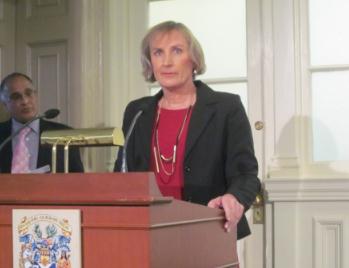Across the country, and around the world, Nov 20 is International Transgender Day of Remembrance (TDoR). But in Nova Scotia, it is now also the day an amendment to the province’s Human Rights Bill was tabled, which means it may soon be illegal to discriminate against individuals because of their gender identity or gender expression.
Speaking at a press conference Nov 20, Leonard Preyra, Nova Scotia’s minister of communities, culture and heritage, noted that the province “can send a strong and clear message that no one who faces violence and discrimination is alone.”
Less than a week ago, the Nova Scotia Rainbow Action Project presented Preyra with a petition containing more than 1,700 signatures. It called for an amendment to the Human Rights Bill. The campaign to gather signatures for the petition began last summer, during Halifax’s Pride events.
“It’s something we’ve been working on for a while, but we’ve been public about it since the summer,” said NSRAP’s chair, Kevin Kindred. “I think it’s a sign that the public support that we tried to rally around this issue this summer has been successful. This change to the act will be a clear sign that trans Nova Scotians have a right to lead safe and dignified lives, free from harassment and discrimination.”
Kindred noted that NSRAP considers this change to be “a good start” and that they will continue to lobby for the trans community. “We must all commit to being part of a cultural change, to be more understanding and less rigid about traditional understandings of gender.”
Kate Shewan, NSRAP’s treasurer and an activist in Halifax’s trans community, spoke at the press conference and recounted how she had been denied life and disability insurance because of her gender transition. “I was joking with a friend that two years ago we couldn’t have imagined I’d be up here talking about trans rights. It’s personally satisfying and gratifying for me to be here today to hear the government take this step.”
Shewan said there is still anxiety in the trans community when it comes to discrimination, especially in terms of employment. “This is a valid fear, and I know people who have had employment issues following a transition. While changing the human rights code will not end discrimination and prejudice, it does send a strong message to employers that this discrimination is not acceptable and reassures victims of discrimination that there is recourse available to them.”
Minister of Justice Ross Landry, who tabled the bill, signalled the importance of Trans Day of Remembrance. “This is a solemn occasion. But I hope that today we can also give the community a reason to mark this day as the start of something more positive and hopeful.”
“As a society it’s important to be inclusive,” he told Xtra. “As a government, what we’re saying is that our diversity is our richness.”
Landry is confident the bill will pass. “I can’t speak for the opposition, but if they’re smart they’ll support this unanimously.”
Landry acknowledged there might be a backlash. “I think there are people out there who will initially not be receptive to what we’ve done. That’s a part of education. I don’t want to judge them good or bad, because that is the journey of learning.”


 Why you can trust Xtra
Why you can trust Xtra


